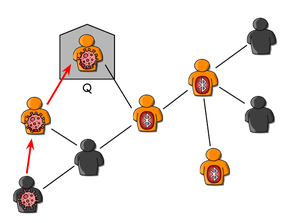Digital tracing apps should incorporate social connections to mitigate disease outbreaks

To help cope with the COVID-19 pandemic, many governments rolled out digital tracing apps which notified people when they had been exposed to infection, reducing the disease’s spread via secondary infections. Widespread adoption of these apps would reduce the need for other, more severe measures, such as lockdowns. But it turns out that figuring out what level of adoption would be enough for the apps to work is a challenging problem rooted in human social behaviour.
‘In science, we have numerous complicated problems, but social behavior is beyond complicated, it’s complex,’ says Abbas K. Rizi, Ph.D. candidate at the Department of Computer Science.
In many countries, privacy concerns reduced usage of tracing apps, watering down the impact to less than had been expected. Public discussion quickly shifted to the critical number of app-users required to mitigate the outbreak.
‘These figures are often based on modelling, which doesn't take into account the in-between structures and hubs of social interaction,’ explains Rizi. His research group recently published a study which examines the effects of varying app coverage and quarantine failures on the epidemic’s threshold, probability and expected size.
To introduce social complexity into digital tracing, the team built models that incorporated the human tendency to be in social relations with similar people, which could be related to age, occupation, wealth and nationality – a property known as homophily. They used these tools to model different scenarios, evaluating the impact of digital tracing in a variety of complex networks.
‘The number of downloads of the digital tracing app shouldn’t be the only meaningful number, but also the degree of homophily among the population that has downloaded the app.’
The social connections of people who download the app affect the outcome. The dynamics differ dramatically when the app is used by socially active groups or people who have few social connections in their daily lives.
‘Our model allows us to simulate when and how large an outbreak can happen even if only a fraction of the population download the app,' says Rizi.
‘The results indicate that digital contact tracing affects the course of epidemics by raising the epidemic threshold and reducing the size of emerging outbreaks. To give a good estimate of the size and the probability of an epidemic, we just need to know the network structure, how applications are distributed among the population, and how well the tracing works.’
Traditional models in epidemiology assume that social connections are random. Network scientists infuse their mathematical models with more realistic, although still not exhaustive, assumptions of social behavior.
‘The way that people are wired together in society can lead to dramatic effects on the size and probability of an outbreak.'
The study was published in the Physical Review E journal, published by the American Physical Society.
Abbas Rizi
Read more news

Renate Zhang’s journey in optimising the cost of creation
During the research program at Aalto University, Renate Zhang developed a cost-saving method that inspired her to pursue a doctoral degree.
Chinonyelum Igwe’s contribution to the frontier of medical AI
Chinonyelum Igwe pursued her dual passions for medicine and AI through the AScI International Summer Research Programme
Aalto University is introducing ORCID’s Researcher Connect service
Aalto University is introducing ORCID's Researcher Connect service, which facilitates information transfer between researchers' ORCID profiles and the university's research information management system, ACRIS.






